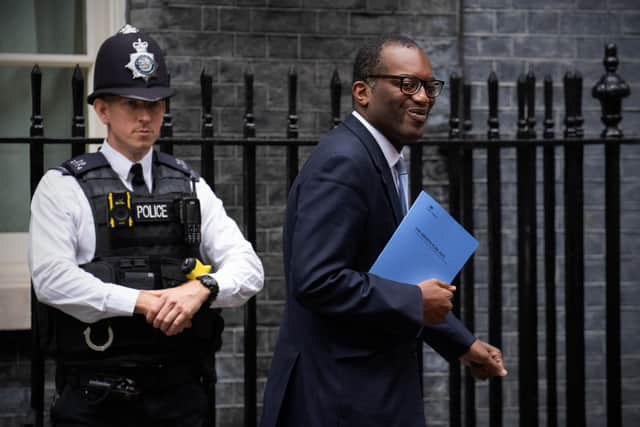Chancellor Kwasi Kwarteng announces biggest tax cuts in half a century
Chancellor Kwasi Kwarteng has announced the biggest tax cuts in half a century as he vowed to break the “cycle of stagnation” and usher in a new era. Mr Kwarteng abolished the top rate of income tax for the highest earners and said the basic rate will be cut to 19 per cent in April 2023 – one year earlier than planned.
Income tax rates and bands are devolved to Scotland but the move will pile huge pressure on the Scottish Government amid a widening tax gap with the rest of the UK.
Advertisement
Hide AdAdvertisement
Hide AdIn a so-called mini-budget axing the cap on bankers’ bonuses and adding restrictions to the welfare system, Mr Kwarteng argued that tax cuts are “central to solving the riddle of growth”. Treasury estimates put the raft of cuts, including Prime Minister Liz Truss’s promises to reverse the national insurance rise and axe the hike to corporation tax, as costing nearly £45 billion a year in 2026.


The major spending package also included a cut to stamp duty in England, the introduction of VAT-free shopping for overseas visitors, a freeze on spirits duty and legislation to force trade unions to put pay offers to a member vote so strikes can only be called once negotiations have fully broken down.
Mr Kwarteng also revealed his estimate that the two-year energy bills bailout will cost around £60 billion over the first six months from October.
Paul Johnson, director of the Institute for Fiscal Studies, said it was the biggest tax cutting event since 1972.
He said: “It’s half a century since we’ve seen tax cuts announced on this scale.”
Mr Kwarteng said his economic vision would “turn the vicious cycle of stagnation into a virtuous cycle of growth”.
But Labour shadow chancellor Rachel Reeves said the strategy amounts to an “admission of 12 years of economic failure” under successive Conservative governments. She described the Prime Minister and Mr Kwarteng as “two desperate gamblers in a casino chasing a losing run”.
By terming it a “fiscal event” rather than a full budget, Mr Kwarteng avoided the immediate scrutiny and forecasts of the Office for Budget Responsibility.
Advertisement
Hide AdAdvertisement
Hide AdMs Reeves said: “Never has a government spent so much and explained so little.”
On bankers’ bonuses Mr Kwarteng argued the cap to limit them to twice salaries “never capped total remuneration”, adding: “So we’re going to get rid of it”.
Comments
Want to join the conversation? Please or to comment on this article.
